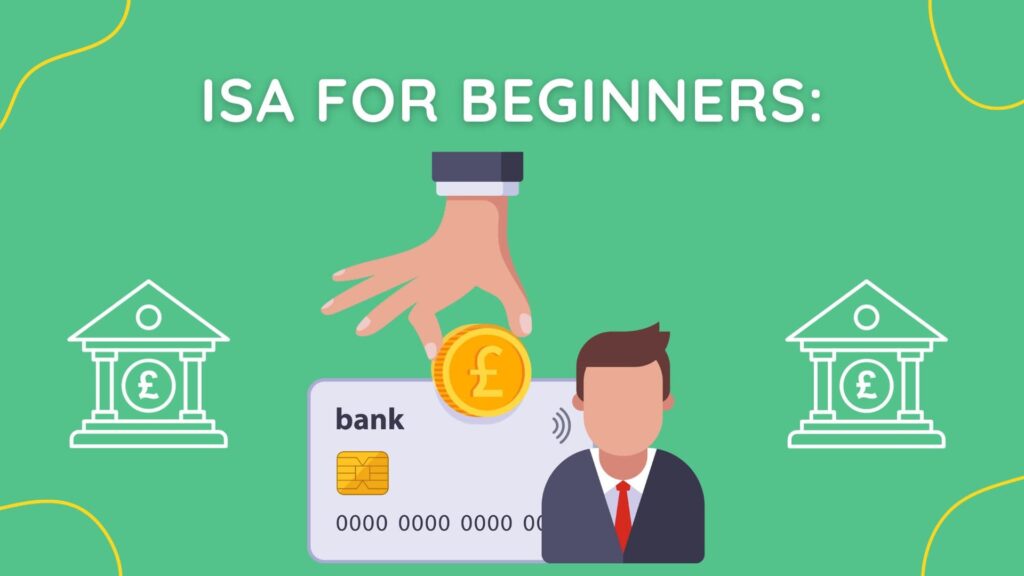
Sammie Ellard-King
I’m Sammie, a money expert and business owner passionate about helping you take control of your wallet. My mission with Up the Gains is to create a safe space to help improve your finances, cut your costs and make you feel good while doing it.
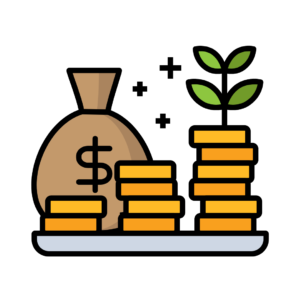
Quickfire Roundup:
An Individual Savings Account (ISA) is a means of saving and investing money without having to pay income tax or capital gains tax.
Every adult in the UK can open an ISA – including you. It allows you to save a maximum of £20,000 without paying any taxes.
There are several different types of ISAs available, cash ISAs being the most prominent. There are also stocks and shares, innovative finance, and lifetime ISAs available.
Ready to start investing? Ready to start saving? Ready to forgo paying tax for growth, interest, and dividends you make from investing or saving?
Call this the ultimate ISA for dummies guide, but no judging here I just want you to walk away having got the info you need.
Opening an Individual Savings Account (ISA) could be the right financial option for you. I’d recommend ISA for beginners for several reasons.
It’s a straightforward and highly beneficial way to save money: to start basic cash ISAs, you must apply online or in person through your bank or building society.
Once set up, you can save or invest up to £20,000 a year. On a basic level, cash ISAs work the same as savings accounts. There are also ISAs specifically designed for investing in stocks and shares and peer-to-peer lending.
Ready to start now. Check out the best stocks and shares ISAs on the market.
Table of Contents
ISA for Beginners: What is an ISA?
ISA is a way to shield yourself from paying taxes on your savings and investments. This allows you to maximise your gains, and spend less time worrying about tax returns.
It is not only tax efficient, but you can also withdraw from your ISA for free (unless you take out a fixed-rate account).
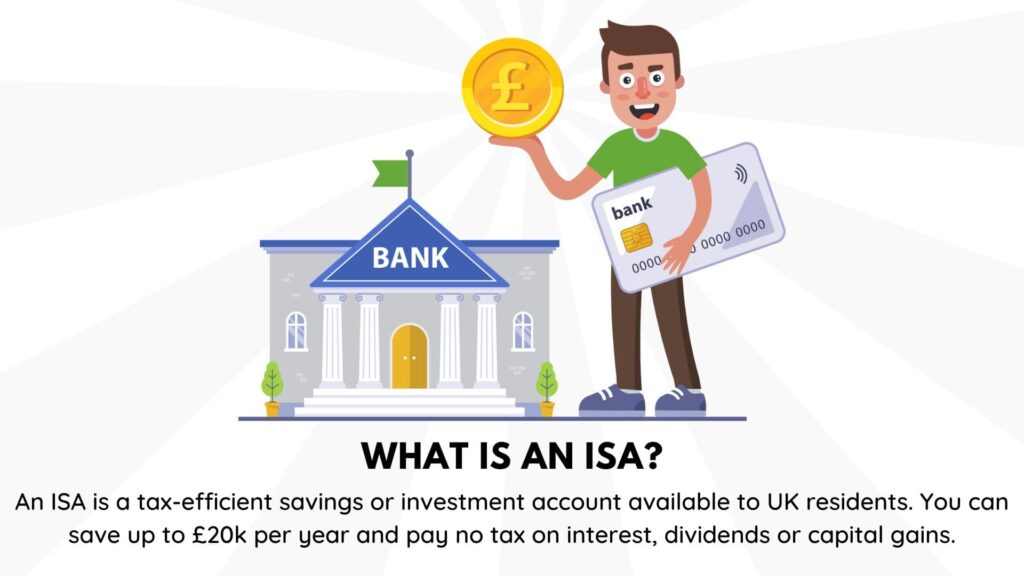
ISAs have existed since 1999 and were devised to encourage people to save money. Every year, an annual ISA allowance is set. This allowance runs from the 6th of April 2023 to the 5th of April 2024.
At the start of each new tax year, everyone’s ISA allowance is reset.
The current ISA allowance is set to £20,000.
🎙️ Listen To This 🎙️
Join us with the Head of Personal Finance at Moneybox Brian Byrnes.
We discuss the future of ISAs, when ISAs are useful, Cash ISAs vs Stocks and Shares ISAs and a whole lot more.
Get the full episode here or hit the play button just below.
How To Start An ISA?
You can set up an ISA with the most high-street banking providers. It’s the same as setting up a bank account, and there are no differences.
Each provider will no doubt ask for different details from the other, but you shouldn’t expect anything unusual.
Let’s be clear there isn’t a best ISA for beginners because it depends on what type you like and your financial goals.
For me the best online ISA providers are Moneybox Plum, Chip and Wealthify.
What are the ISA eligibility requirements?
In terms of eligibility requirements, you need to either be a UK resident or be serving as a Crown employee (or be married to or be in a civil partnership with someone who is).
By Crown employee, I mean either a diplomat, a civil servant, or an armed forces member.
Essentially be a UK citizen to save on complications.
Besides these eligibility requirements, you’ll also need to provide the following:
- Proof of address
- Proof of identity (i.e., a UK driving license or your passport)
- National Insurance number
The Different Types of ISAs
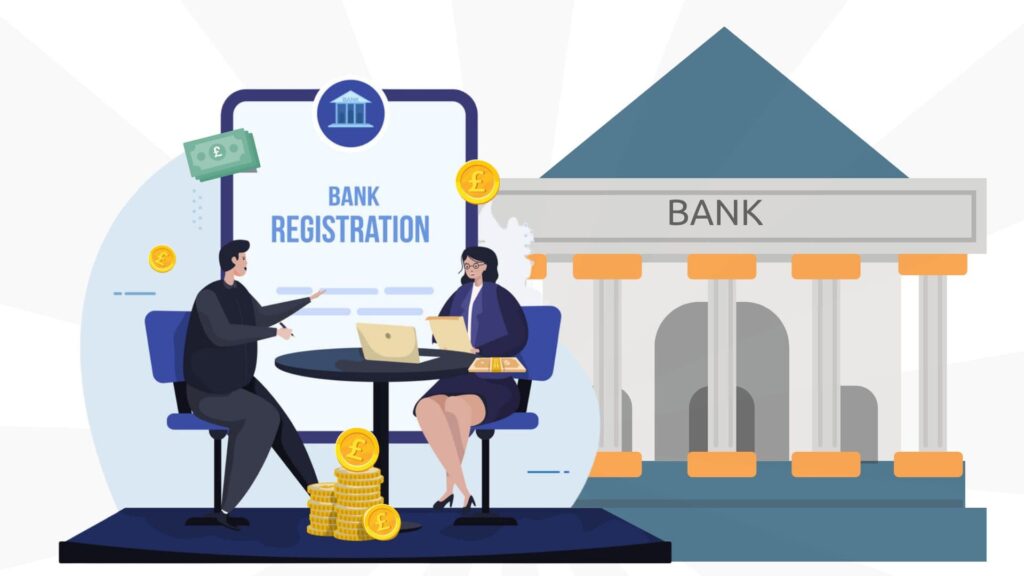
As I already mentioned, there are several types of ISAs available.
Let’s take a closer look at what each type entails:
Cash ISA For Beginners
What is a cash ISA?
A cash ISA acts in basically the same way as a regular savings account – except, of course, you’re not taxed for any interest you make.
Cash ISAs are the most readily available ISA type, and also the most popular. If you enquire about one at your bank and building society, they’ll most likely offer you one there and then.
No set-up fees are involved, and you can sometimes create a cash ISA online. Normally, the only stipulation is that you must be 16 years old.
Are there different types of cash ISAs?
Within the cash ISA bracket, there are different types of accounts available. Easy access cash ISAs are good if you must withdraw savings fast.
On the other hand, fixed-rate accounts are better for long-term investments, as they lock away your savings for a period between 1 and 5 years.
Best of all, cash ISAs are protected by the Financial Services Compensation Scheme (FSCS). This means you’ll receive automatic protection on your savings of up to £85,000.
Stocks and shares ISA For Beginners
What is a stocks and shares ISA?
Stocks and shares ISAs are only available for those 18 years and older. If you want to invest in the stock market but don’t want to pay the taxes associated, this ISA allows you to invest £20,000 per tax year.
With a stocks and shares ISA, you don’t pay capital gains, dividends, or income tax on the investments that you make.
What can you invest in with a stocks and shares ISA?
- Funds – This involves investing in lots of different shares. These shares are pooled together and managed by a fund manager. The range of investments lowers the risk of you losing money. The fund manager is an expert in the field who knows how best to bring diversity to your portfolio.
- Stocks and bonds – This is when your investment goes to large corporations and governments. Due to the size of the companies on the receiving end, stocks and bonds are seen as lower risk than standard investment funds.
- Property – Your money may also go towards an investment property. This can include both residential and commercial property.
Although stocks and shares ISAs make investing easier, stock market investment still carries the same amount of risk.
Your investment funds could go either way: you could profit massively or lose money.
Recent changes in the 2023 Autumn budget have meant you can now open as many ISAs as you like in a tax year (previously one).
This means if you want to try one out for a little while you can and make the most of sign up offers too.
Check out the best stocks and shares ISA for beginners just below.
HOW TO OPEN A STOCKS AND SHARES ISA?
Opening a stocks and shares ISA is just like opening any other bank account or ISA.
You simply need to find a provider that you like and go through the process.
When it comes to stocks and shares ISAs for beginners it’s important to know there are three main types of investment ISAs.
- Expert managed: This is where the professionals will take care of the investments for you guiding you through the process and working with you to create a portfolio
- Robo-advisors: This is where the professionals will use AI alongside their work to help create the right portfolios for you
- DIY: This is where you’re on you’re own and need to pick everything yourself
Each of these three options have their pros and cons plus equally different cost levels.
Junior ISA For Beginners
What is a Junior ISA?
Similar to a regular ISA, a JISA is for those under the age of 16. A parent or guardian can set up a junior ISA that the child can access once they turn 18. fe
Like an ISA, a JISA is an FSCS-protected saving account for those who are totally new to the world of banking.
Who controls a jUNIOR isa?

Although junior ISAs are made in the child’s name, it’s totally monitored and controlled by the parent or guardian (unless the child is older than 16).
When the child turns 16, they can take control of the account – but they cannot withdraw from it until they turn 18.
wHAT IS THE ALLOWANCE FOR A Junior ISA?
For the current 2023/2024 tax year, the tax-free allowance for a junior ISA is £9,000.
Lifetime ISA For Beginners
What is a lifetime ISA?
Lifetime ISAs help you save up for either your first home or retirement. Normally, only those between the age of 18 and 39 can set up a lifetime ISA.
Each year, you can deposit a maximum of £4,000 into a Lifetime ISAS account tax-free.
Each year, you’ll also receive a 25% bonus from the government (up to a total of £1,000 per year). This bonus will be paid monthly and you’ll receive it right up until you’re 50.
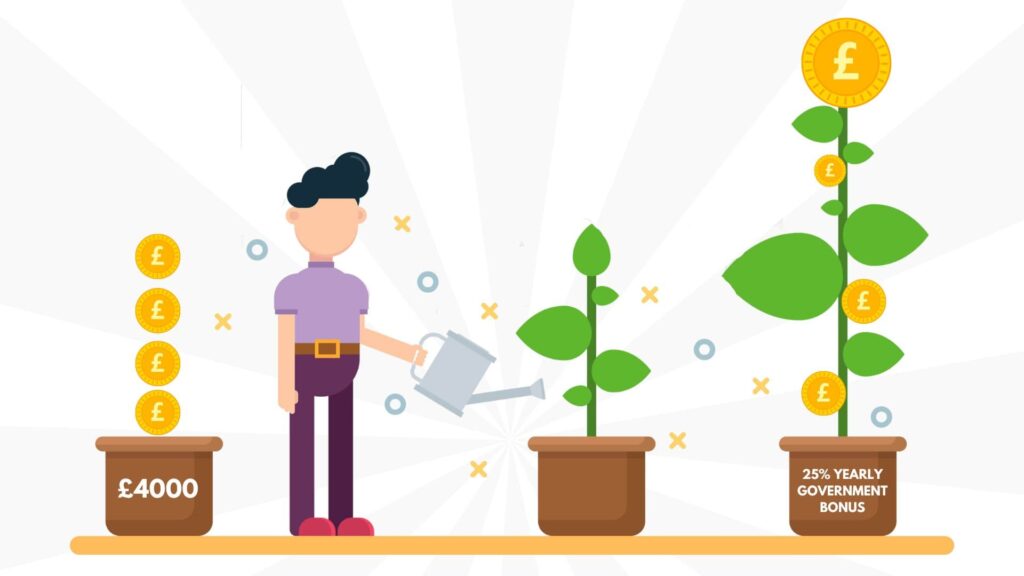
Are there any drawbacks of a lifetime ISA?
However, the big drawback of a lifetime account is that you’ll be charged 25% if you withdraw your savings for any other reason than your first home or retirement.
Help to Buy ISA For Beginners
What is a help to buy ISA?
This account type is designed exclusively for first-time home buyers.
You can deposit £1,200 during the initial month and £200 for every month after. Once you’re ready to buy, you’ll receive a 25% bonus from the government.
Innovative Finance ISA For Beginners
What is an innovative finance ISA?
If you’d like to make tax-free returns on peer-to-peer lending, you should set up an innovative finance ISAS account.
This is a relatively new type of ISA that’s only been offered since 2016.
What can you use an innovative finance ISA for?
Like other ISA types, you can use innovative finance to lend up to £20,000 to a peer without being charged any tax.
If you don’t know, peer-to-peer lending is investing in someone else and charging them an interest rate on the money borrowed.
Most innovative finance accounts will allow you to invest in individuals, while others will be specifically designed for business lending.
Peer-to-peer lending companies facilitate this exchange of cash. Normally, they spread your investment over several projects to lower the risks involved. This provides you with a varied investment portfolio.
Please note that IFIs are reserved only for people with investing experience, and lenders will require you to demonstrate this before you can lend money.
The Benefits of an ISA
Split your ISA allowance – You don’t have to spend the entirety of your ISA amount on the same kind of investment or saving scheme. Instead, you could split it up over several investment options. For example, you could spend £10,000 on a stocks and shares ISA and your remaining £10,000 on an innovative finance ISA.
Spend your ISA allowance as one lump sum – Instead, you could spend all of your ISA limits on one investment type. This would allow you to receive the maximum in tax-free benefits when investing solely in a stocks and shares ISA, for example.
ISAs are easy to switch – Banks and building societies offer competitive interest rates for ISAs. It’s normally easy to switch ISAs if you find a bank offering you a better investment deal. For example, if you see one bank offering 4% for an easy-access cash ISA while you’re only getting 3% from your current ISA provider, you could switch.
Transfer investment type – Just as it’s easy to switch ISA providers, it’s also easy to alter your investment ISA portfolio. For example, you could switch between a stocks and shares ISA and a cash ISA. They’ve both got the same tax efficiency, so there’s no real difference.
Your partner can inherit your investment ISA – If you pass away before you withdraw your ISA, your partner can inherit your ISA. They can then add it to an account of their own.

The drawbacks of an ISA
You can’t carry over your ISA allowance – If you’ve got an unused allowance, you can’t carry over any remaining allowance to the next tax year. If you don’t use all of your ISA allowances by midnight on the 5th of April, you’ll lose the remaining amount. On the 6th of April – the start of the new tax year – you’ll receive a new limit.
No tax relief – Although opening an ISA account is the most tax-efficient way to invest money, it means you don’t benefit from tax relief. This is where the benefits of SIPPs seem most appealing.
Can’t create a joint-name ISA account – If you and your partner would like to set up a split account, you’ll need to pick an ISA alternative – such as a standard savings account.
What's the Difference Between ISAs and Personal Pensions?
- Pensions are locked away until you’re a certain age, while ISAs can be accessed anytime.
- ISAs are tax-free, while pensions are not.
- You can benefit from tax relief with a pension, but you can’t with an ISA.
FAQs
Can you become a millionaire with an ISA?
It is possible to become a millionaire using an ISA – as long as you can stick with it for 25 years.
If you put the maximum into your ISA every year and maintain a growth rate of 5%, you will be a millionaire by your 25th year of saving.
Is it better to set up an ISA or a savings account?
ISA is better than a savings account because you don’t have to pay tax. Plus, you can withdraw money tax-free at any time – unlike savings accounts.
If you’re only planning on saving a little, a savings account may be the better option for you.
If you’re planning on saving up a lot – i.e., if you’re planning on buying your first home – an ISA would definitely be the better option.
Final Thoughts
Opening an ISA is a great way to both save money and profit massively from interest. Don’t pay tax – instead, start an investment fund with a stocks and shares ISA.
Or, find the ISA provider that offers the best rates on cash ISAs (the best ISA for beginners).
Whichever ISA you go for, you’ll be surprised how easy they are to set up and maintain.
Share on social media
Disclaimer: Content on this page is for informational purposes and does not constitute financial advice. Always do your own research before making a financially related decision.

